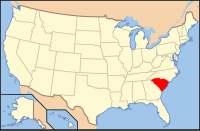Clarendon County, South Carolina
| Clarendon County, South Carolina | |
|---|---|

Alderman's 20 Stores in One in Manning
|
|
 Location in the U.S. state of South Carolina |
|
 South Carolina's location in the U.S. |
|
| Founded | 1785 |
| Seat | Manning |
| Largest city | Manning |
| Area | |
| • Total | 696 sq mi (1,803 km2) |
| • Land | 607 sq mi (1,572 km2) |
| • Water | 89 sq mi (231 km2), 13% |
| Population | |
| • (2010) | 34,971 |
| • Density | 58/sq mi (22/km²) |
| Congressional district | 6th |
| Time zone | Eastern: UTC-5/-4 |
| Website | www |
Clarendon County is a county located below the fall line in the Coastal Plain region of U.S. state of South Carolina. As of the 2010 census, its population was 34,971. Its county seat is Manning.
This area was developed for lumber and mills, including textile mills. Clarendon County boasts one of the largest man-made lakes in the United States, Lake Marion, completed in 1941 as a New Deal project. It was planned as part of a national rural electrification initiative. Since the late 20th century, the dam's generation of hydroelectric power has also stimulated economic development and industry in the region.
The South Carolina state legislature, dominated by white Democrats, established racial segregation of public facilities by state law in the late 19th century. During the Civil Rights Movement, Clarendon County was the site of the Briggs v. Elliott trial challenging segregation of public schools. This case was one of five combined with what came to be known as Brown v. Board of Education, under which the United States Supreme Court ruled in 1954 that racial segregation of public schools was unconstitutional.
Clarendon County was officially established in 1785, shortly after the American Revolutionary War, when the legislature divided Camden District into seven counties. One was Clarendon County. It was named after Edward Hyde, who was a Lord Proprietor and earl of Clarendon.
During the American Revolutionary War, the Battle of Half Way Swamp was fought in December of 1780. That was one of the many Revolutionary battles that took place in the area of Clarendon County. Others in this area were the following battles: Richbourg’s Mill, Nelson’s Ferry, Fort Watson/Santee Indian Mound, and Tearcoat. The Swamp Fox Murals Trail has been established as an historical landmark depicting the American Revolution and General Francis Marion, the "Swamp Fox".
...
Wikipedia
